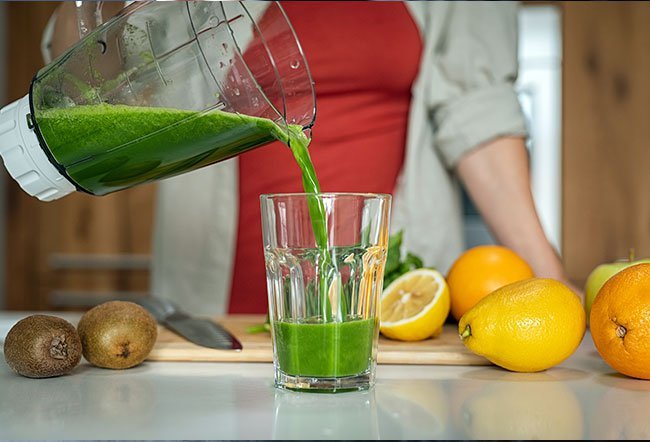Are Detoxes and Cleanses Safe?

Detoxification refers to the removal of toxins from the body. The human body has an organ dedicated to detoxification, the liver. The liver works to purify the blood of all the toxins the body ingests. A variety of so-called detoxification diets (detoxes or cleanses) claim to clear the toxins from the body, aid in weight loss or promote health. The idea is to purify and purge the body of all the toxins. People with good overall health don't need to cleanse because their bodies are already doing a good job.
Though detoxification diets are popular, there is little evidence that they eliminate toxins from the body. So, there are significant health risks associated with their use and they are not particularly safe.
A better approach would be to eat healthier and make lifestyle changes rather than go on a potentially harmful cleanse. Cutting back on sodium, added sugars and refined grains and eating more whole grains, fruits, vegetables, proteins and healthy fats would be a healthier option.
Cleanses go by many names and descriptions, including
- Liquid cleanse: Replaces the solid food with liquids, such as juices, smoothies, soups or herbal supplements.
- Elimination diet: Supports the body’s natural detoxification by providing supplements that boost liver and kidney function.
- Colon cleanse: Cleanses the digestive system by using laxatives. This is also called colonic irrigation.
Common ways to cleanse and detox
Detoxification programs range from total starvation, intermittent fasting to simpler food modifications. These include
- Fasting
- Drinking fruit and vegetable juices, water or similar beverages
- Drinking only specific liquids, such as salted water or lemon juice
- Eating only certain foods
- Avoiding foods high in heavy metals and contaminants
- Avoiding all allergenic foods and then slowly reintroducing them
- Taking supplements or other commercial products
- Taking herbs
- Using colon cleanses, enemas or laxatives
- Eliminating alcohol, coffee, cigarettes and refined sugar
- Reducing environmental exposures
- Using a sauna
What are the risks associated with cleanses and detoxes?
Before planning a detox diet, it is important to get a doctor’s advice and learn the potential side effects and risks of detoxes and cleanses. Side effects and risks include
- Calorie restriction: Several detox diets recommend fasting or severe calorie restriction. Short-term fasting and limited calorie intake can result in fatigue, irritability and bad breath. Long-term fasting can result in deficiency of energy, vitamins and minerals as well as electrolyte imbalance and sometimes even death.
- Deficiency of nutrients: When food intake is restricted, important nutrients, such as healthy fats, vitamins, minerals and proteins needed for body functions and optimum health may not be available, posing various risks to health.
- Short-term weight loss: When people fast for several days, weight loss will happen due to loss of water weight and muscle mass, but not fat. Most people regain the lost weight after stopping the detox and when they start eating again.
- Overdosing: Some detox diets pose the risk of overdosing on supplements, laxatives, diuretics and water, causing harmful effects on the body.
- Lack of regulation and monitoring: The ingredient labels on detox products may be misleading. There is always the risk of serious and fatal consequences associated with these products.
- Glycemic control in diabetic patients: In people with diabetes, low caloric intake or high intake of fruit juices may alter the blood sugar levels. This would require changes in their insulin regimen during the cleanse program. Before going on a detox diet or changing eating patterns, consultation with a doctor is necessary.
- Detox diets can be addictive: Going without food or having an enema can make some people feel high. This can lead to a dangerous addiction, leading to health problems, eating disorders, heart problems and even death.
- Laxative effects: Most supplements used during detox diets are laxatives and can cause gastrointestinal distress, frequent bowel movements, dehydration and electrolyte imbalances.
- Metabolism slows down: Fasting for long periods can slow down a person's metabolism, making it difficult to keep weight off or to lose weight later.
- Unpasteurized juices: Unpasteurized juices or regular packaged juices that have not been treated to kill harmful bacteria can cause serious illness in children, the elderly, the immune-suppressed people and those at high risk for infection.
- High oxalate intake: Many juices are made from foods that are high in oxalates, such as spinach, beets, kiwi, parsley and soy. Drinking large quantities of high-oxalate juice can increase the risk of kidney problems.
- Risks in colon cleansing: Associated risks with colon cleansing include bowel perforation, infection, dehydration, electrolyte imbalance, cramping, bloating, nausea and vomiting. People with a history of gastrointestinal disease, colon surgery, hemorrhoids, anatomic colon abnormalities, kidney disease or heart disease are at a higher risk.
- Dehydration and electrolyte abnormalities: Detox diets, calorie restriction and bowel cleansing programs could lead to dehydration and electrolyte disturbances.
Cleansing diets are not recommended for
- Populations at risk: Certain people should not start detox or calorie-restricting regimens without consulting a doctor first. People at risk include children, adolescents, elderly, malnourished people, pregnant or lactating women and those who have diabetes, eating disorders or other chronic medical conditions.
- Teens: Teenagers need adequate calories and protein to support their rapid growth and development and physical activities. Detox diets don’t provide enough calories and can be risky for teenagers.
- Athletes: Lack of carbohydrates would result in loss of sources of energy during exercise. So, a detox or cleanse isn’t suitable while training for any sport.

